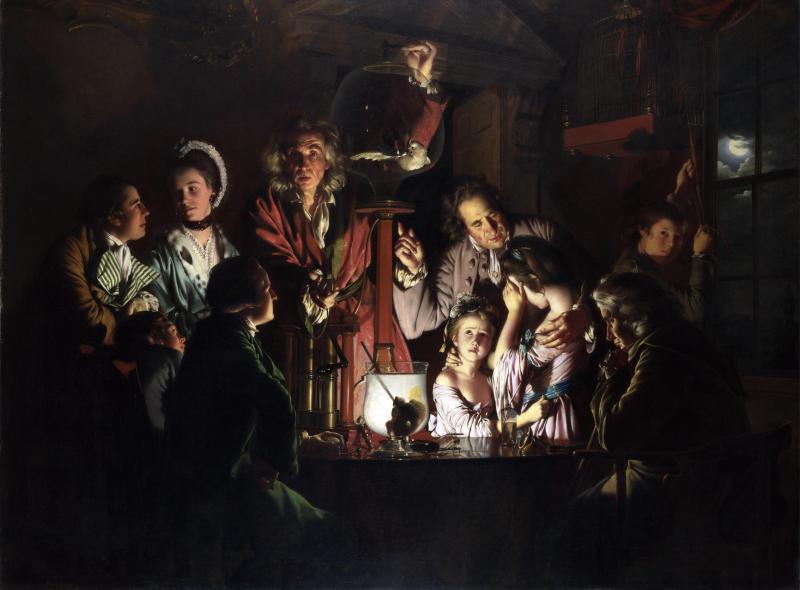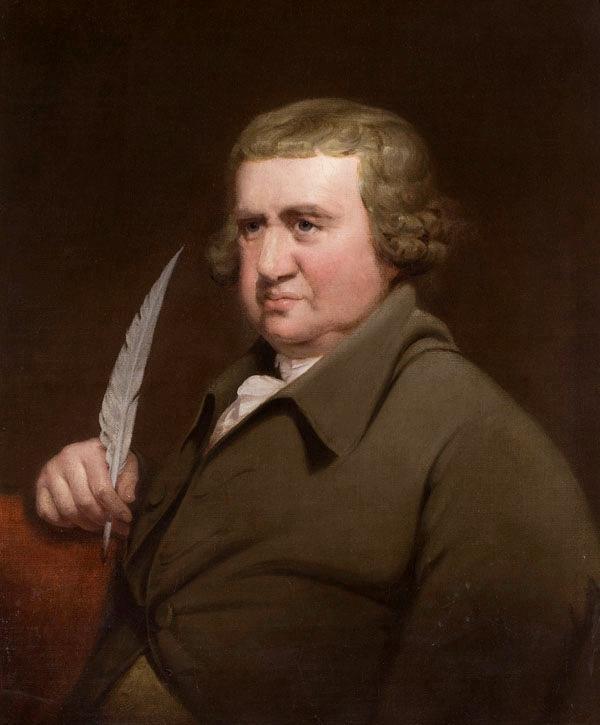Résumé
Erasmus Darwin (1731-1802) was the author of The Temple of Nature, in which he considers the concept of sociability as one of the keys to the evolution of species: love and sympathy guide the species toward perfection through the multiple changes caused by transformism. To some extent, Darwin’s theory reflected his own social practices: he wanted to lead British society toward a golden age through his network of radical thinkers, including the members of the Lunar Society but also the circle of Joseph Johnson in London, struggling for abolitionism and social reforms.
Half a century before Charles Darwin published his essay On the Origin of Species in 1851, his grandfather Erasmus Darwin had developed his own thoughts on the gradual transformation of species through time. The concept of sociability was fundamental to his theory, as Erasmus Darwin explains in his scientific poem The Temple of Nature, which was published posthumously in 1803: indeed, sociability was supposed to lead the species toward ‘greater perfection’1 through a series of changes.
Erasmus Darwin investigated the origin of sociability in primitive species through speculative science and experimentation. By observing micro-organisms such as the volvox or the polypus, he supposed that the affection of a parent to a child was the first step toward the formation of sociability: ‘this affection from the parent to the progeny existed before animals were divided into sexes, and produced the beginning of sympathetic society’ (Darwin, additional note XI, not paginated). The social chain is made stronger with the transformation of species: as the nervous structure (or ‘sensorium’) grows, individuals become increasingly sensitive to their own affections and receptive to the others’, which creates a community of sensation beyond the strict limit of the parent-child relationship. Darwin used the image of the social chain several times as well as the metaphor of weaving to describe it.
However, contrary to Rousseau, according to whom man is born free, but is in fetters everywhere (The Social Contract), this social chain is not a burden, but testifies to a significant improvement in the transformation of a species. Sociability marks the beginning of the enlightenment of mankind, and Darwin marveled at such a change in which he saw the very origin of man: ‘How Love and Sympathy the bosom warm, / Allure with pleasure, and with pain alarm, / With soft affections weave the social plan, / And charm the listening Savage into Man’ (Darwin 18).
In those lines, the distance between savagery and mankind is a distance in time, not in space. The people that Darwin considered as savages are not the indigenous populations of distant lands, but the primitive forms of mankind preceding the long series of biological transformations of the species through time. Savagery is not absent from the eighteenth-century society, though: Darwin denounced slavery as an obstacle to the progress of mankind. Slavery is a counter-model of sociability as it is defined by Darwin: it is the refusal to sympathize with fellow-humans and share the community of affects which binds them together. ‘Am I not a man and a brother?’ says the slave on the famous medallion designed by Darwin’s friend Josiah Wedgwood, which Erasmus Darwin described in verse in an earlier poem, The Botanic Garden (1792).
- 1. Erasmus Darwin, The Temple of Nature, or The Origin of Society (London: J. Johnson, 1803), p. 53.
Despite his hostility to slavery, Darwin was resolutely optimistic, and confident that mankind was slowly on its way to the golden age. The Temple of Nature was originally entitled The Progress of Society and aimed to show the fives ages of sociability: the Age of Hunting, the Age of Pasturage, the Age of Agriculture, the Age of Commerce (which was characterized by ‘luxury’ and ‘slave trade’) and the Age of Philosophy. The Age of Philosophy was yet to come; it was an idealized future without war and crime: ‘Philosophy. Science. Peace. Elements subdued. Swords turned to ploughshares. Every man under his fig tree. Moral world. Love each other’, as Darwin summarizes it in his first draft.2
Darwin was eager to offer his own scientific and political contributions to society, to help mankind reach the Age of Philosophy. A prolific inventor and a radical thinker, he was one of the founding members of the Lunar Society of Birmingham, a coterie of industrialists and intellectuals among whom were Josiah Wedgwood, Joseph Priestley, Matthew Boulton and many others, who would gather during full moon, often at Darwin’s house, and discuss science and politics. The club was at the core of what is now commonly known as the Midlands Enlightenment.
The practice of sociability within the Lunar Society could be considered as the reflection of Darwin’s theory on the progress of society. The sharing of their political aspirations, especially their struggle for abolitionism and their common enthusiasm for the French Revolution, led to several remarkable achievements which turned out to be influential beyond the limits of Birmingham. One of their public letters was read at the French Convention Nationale, and Wedgwood’s famous medallion became a symbol of the anti-slavery movement.
- 2. David Erdman (ed.), The Progress of Society, by Erasmus Darwin, electronic edition. 18 April 2021, https://romantic-circles.org/editions/darwin_temple/progress/progress.html
Darwin was also a member of Joseph Johnson’s more informal circle of writers, artists and various dissenters in London who shared his radical ideas. Johnson also published the works of Mary Wollstonecraft and Joseph Priestley; he introduced Erasmus Darwin to Henry Fuseli and to William Blake. Though Darwin and Blake may have never formally met, it is now obvious that Darwin’s revolutionary poetics was influential on the young Blake, even though Darwin’s passion for mechanics may seem to be at odds with Blake’s ‘satanic mills’.3
The ‘Satanic mills’ of the Industrial Revolution were nonetheless another result of Darwin’s sociability. Darwin was persuaded that technological improvement would go along with the progress of society and was determined to make it possible with the help of his friends. He helped James Watt design the first plans of his steam engine, and in turn received precious advice from him on the building of his Artesian wells. Darwin, Wedgwood and Boulton worked together on the construction of a dam, and Darwin designed a horizontal mill for Etruria, Wedgwood’s ceramics factory.
Erasmus Darwin also shared his ideas with the Royal Society. One of his first scientific papers, ‘Remarks on the Opinion of Henry Eeles, Esq., concerning the Ascent of Vapour’, was on the role of electricity in the rising of vapour; Darwin’s conclusions aimed to improve the steam engine. It was published in the Philosophical Transactions in 1757 and Darwin was elected a Fellow of the Royal Society four years later. He published several other articles in the following years, including one on Artesian wells, ‘An account on an artificial Spring of Water’, in 1785.
- 3. The quotation is from Blake’s epic poem Milton: 'And was Jerusalem builded here. / Among these dark Satanic Mills?'. David Erdman (ed.), The Complete Poetry and Prose of William Blake (New York and London: Anchor Books, Doubleday, 1988), p. 95.
However, Darwin’s network of sociability extended far beyond the boundaries of the British Isles: Erasmus Darwin had met Jean-Jacques Rousseau, and his works were read by Jean-Baptiste Lamarck who was the author of a pioneering work of transformism in France, Philosophie Zoologique (1809). Indeed, Lamarck seems to have read Darwin’s Zoonomia4 and he may have read The Temple of Nature as well, although that needs to be confirmed by further research. In Darwin’s rich correspondence are also letters from, and addressed to, Benjamin Franklin. Erasmus Darwin was very keen on writing to a man he admired so much but did not know where to send his letters to him, so he just wrote ‘Doctor Franklin, America’ on the envelope.5 The letter reached its recipient who replied to Darwin.
The two men had the chance to meet face to face when Franklin travelled to England. Darwin invited his American friend to join the Lunar Society, hoping to make it international: the sociability of revolution may have been a revolution of sociability, with a dense network of social reformers on both sides of the Atlantic to hasten the improvement of society. Significantly, when Darwin wrote about Franklin, he used the same metaphors and expressions as the ones he used in The Progress of Society to describe the Age of Philosophy: the golden age of sociability seemed at hand. Unfortunately, their projects came to an end when Franklin died in 1790.
Darwin died twelve years later, in 1802. He would certainly not have seen the advent of his golden age of Philosophy in the mercantile imperialism of the Victorian era, but he may have been pleased with the fact that his ideas on sociability were not forgotten. The Temple of Nature was read by his grandson Charles Darwin before he theorized evolutionism. Charles Darwin himself became a Fellow of the Royal Society and kept up a voluminous correspondence with an extensive network of scientists of all nationalities, as if something remained of his grandfather’s ideal: a luminous dream of the Golden Age of sociability, both enlightened and enlightening.
- 4. Jean-Baptiste Lamarck mentions Erasmus Darwin in his Encyclopédie Méthodique de Botanique, tome VIII, (Paris: Agasse, 1808), p. 438.
- 5. Desmond King-Hele (ed.), The Collected Letters of Erasmus Darwin (Cambridge: Cambridge University Press, 2007), Desmond King-Hele, ed., The Collected Letters of Erasmus Darwin (Cambridge: Cambridge University Press, 2007), 29 May 1787, p. 285-286.
Partager
Références complémentaires
Gaull, Marilyn, 'Joseph Johnson: Webmaster', The Wordsworth Circle (vol. 40, n° 2, Spring 2009), p. 107-110.
King-Hele, Desmond, Erasmus Darwin: A Life of Unequalled Achievement (London: Giles de la Mare, 1999).
King-Hele, Desmond (ed.), The Collected Letters of Erasmus Darwin (Cambridge: Cambridge University Press, 2007).
Musitelli, Sophie, 'Erasmus Darwin : de la métamorphose au transformisme', Darwin dans le combat des idées (Paris : L’Harmattan, 2012), p. 33-45.
Priestman, Martin, The Poetry of Erasmus Darwin: Enlightened Spaces, Romantic Times (Farnham: Ashgate, 2013).
Smith, Christopher and Arnott, Robert (eds), The Genius of Erasmus Darwin (Aldershot: Ashgate, 2005).
Uglow, Jenny, The Lunar Men: The Friends who Made the Future (London: Faber & Faber, 2003).
In the DIGIT.EN.S Anthology
Erasmus Darwin, The Progress of Society (c. 1799).

